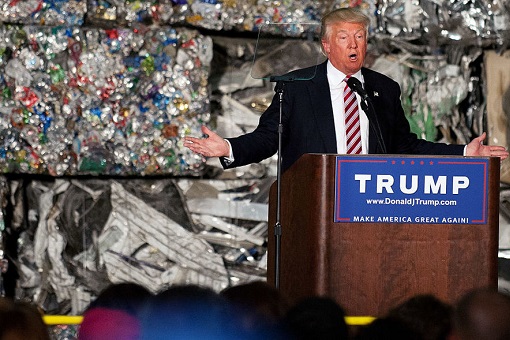When Donald Trump proudly signed an executive memorandum to slap tariffs on up to US$60 billion in Chinese imports in March last year, the U.S. president hadn’t a clue that some dirty business would hit back the Americans. He has been whining and bitching about China’s “unfair” trading practices, intellectual property theft and whatnot.
The U.S. has a bad habit of unilaterally impose tariffs or other trade restrictions or sanctions on any countries that do not “kowtow” to the superpower. When the global rules such as those of the WTO (World Trade Organization) are not in their favour, the U.S. will create their own rules to punish other disobedient nations – called the long-arm jurisdiction.
So, it was quite amusing that just a day after Trump punished China with tariffs of up to US$60 billion in imports, the U.S. had the cheek to demand the Chinese not to proceed with its ban on the import of “foreign garbage”. This time, however, the U.S. saw it fit to complain to the WTO’s Council for Trade in Goods about China’s refusal to import trash from America.

Apparently, Trump administration had forgotten about the containers of rubbish that the Americans had been dumping into China. Not only the Middle Kingdom provided a huge market opportunity for the U.S., the country also provided a perfect solution to the Americans’ problem – an unlimited dumping ground of trash from the West.
The U.S. is the top producer of waste, according to the World Bank. The country exported US$16.5 billion in scrap in 2016, more than any other country. Every day, nearly 4,000 shipping containers full of recyclables would leave U.S. ports bound for China. Over two-thirds of America’s waste paper exports ended up in China in 2016.
Paper and plastic scrap exports to mainland China topped US$2.2 billion – more than U.S.’ exports to China of wheat, rice, corn, meat, dairy and vegetables combined. As early as July 2017, Beijing notified the WTO that China would start enforcing its new “National Sword” policy effective January 1, 2018 – banning24 types of solid waste, including various plastics and unsorted mixed papers.

The trade war declaration by Trump came at a perfect time. China no longer had to “give face” and immediately enforced the policy – but the U.S. was not happy. China willingly imported solid waste since 1980s, largely because its rapidly growing economy fuelled gigantic demand for cheap raw materials. The environmental problems were overshadowed by the economic interests.
It was a win-win solution. China got cheap raw materials through recycling, while the U.S. solved their garbage problem cheaply through dumping. Not anymore! The U.S. complained to the WTO – “China’s import restrictions on recycled commodities have caused a fundamental disruption in global supply chains for scrap materials, directing them away from productive reuse and towards disposal.”
It’s not hard to understand why the U.S. has been so upset that China refused to take their trash. Sure, they can send them to India or Pakistan, but obviously it would be more expensive than shipping the waste to China. Sending “American garbage” to China is cheaper because they are placed on ships that would “otherwise be empty” when they return to the Middle Kingdom after delivering consumer goods.

The crisis of backlogs of recyclable waste has been plaguing the U.S. since then. Philadelphia, Chicago, Arizona, Memphis, Indianapolis and New Hampshire have no choice but to burn their trash or just throw away the recyclable items. But the U.S. was not the only Western country affected. A whopping 87% of plastic wastes from the European Union were exported to China.
In the absence of China, the garbage – call “yang laji (foreign garbage)” by the Chinese – found its way to developing and poor Southeast Asia countries including Malaysia, Indonesia, Philippines and Vietnam. All hell breaks loose when the Philippine President Rodrigo Duterte loses patience when he found out 69 containers of garbage from Canada have been sitting unwanted in the country for about 5 years.
“The Philippines as an independent sovereign nation must not be treated as trash by other foreign nation,” – says Duterte’s spokesman. Canada argued that the waste, exported to the Philippines between 2013 and 2014, was a commercial transaction. Although the consignments were labelled as recyclable plastics, they were filled with stinky rubbish including soiled diapers, kitchen waste and household garbage.

Canada has offered to take the rubbish back, but it deliberately missed the May 15 deadline. In protest, President Duterte, also known as the “Dirty Harry” of the Philippines, has called back top diplomats from Canada. He has also ordered a private shipping company to send the containers of garbage back to Canada and leave them within its territorial waters if it refuses to accept the rubbish.
Malaysia, on the other hand, became the world’s main destination for plastic waste last year after China banned its import. Yeo Bee Yin – Ministry of Energy, Science, Technology, Environment and Climate Change – the new minister under the newly installed Malaysian government, was as angry as President Duterte when she found out the fact on the ground.
Heck, even Bangladesh has been sending its contaminated plastic waste to Malaysia. Miss Yeo, upon inspection of containers of trash at Port Klang, said – “These containers were illegally brought into the country under false declaration and other offences which clearly violates our environmental law.” She called those responsible for importing in waste into the country as “traitors”.

Like the case in the Philippines, the garbage smuggled in to Malaysia was falsely declared as recyclable. Since the closure of China as the West’s favourite dumping ground, dozens of recycling factories have cropped up in Malaysia, many without operating licenses. Minister Yeo said 60 containers of 3,000 metric tonnes of trash that had been imported illegally would be sent back.
Malaysian officials have identified at least 14 origin countries, including the U.S., U.K., Japan, France, Canada, Australia and Spain, for its unwanted waste. Even Saudi Arabia and China have sent containers of trash to the country. It was exposed that a recycling company from the U.K. had actually exported 50,000 metric tonnes of plastic waste into Malaysia over the past 2 years.
Yeo Bee Yin said – “If you ship to Malaysia, we will return it back without mercy.” She warned that if the “traitors” fail to ship back the garbage they had brought in within 2 weeks, they will be brought to court. Astonishingly, the imports of plastic waste have jumped from 168,500 tonnes (2016) to 316,600 tonnes (2017) to 456,000 tonnes (January – July 2018).

That means before the downfall of the previous corrupt Barisan Nasional government in May 2018, former Najib regime had been happily welcoming toxic garbage from the rich nations. In other words, in exchange for money, Malaysia had already taken in 3,380 containers in 2016, 6,332 containers in 2017 and 9,120 containers in Jan-July 2018 of garbage which even Bangladesh didn’t want.
Admitting that what she has discovered was just the tip of the iceberg, however, the environment minister Yeo said – “We will fight back. Even though we are a small country, we cannot be bullied by developed countries. We cannot be a dumping ground for developed countries. Malaysians deserve as good an environment as people of the developed world.”
Indeed, for more than 25 years, the junks and toxic garbage of richer nations have been sent to poorer parts of the Asia-Pacific. When the majority importer – China – decided to shut its door to the stinky and unwanted waste business, they were easily redirected to Southeast Asian nations. It’s time to tell the rich and developed nations to stop bullying and dumping their trash.

FINANCE TWITTER




No comments:
Post a Comment
Note: Only a member of this blog may post a comment.